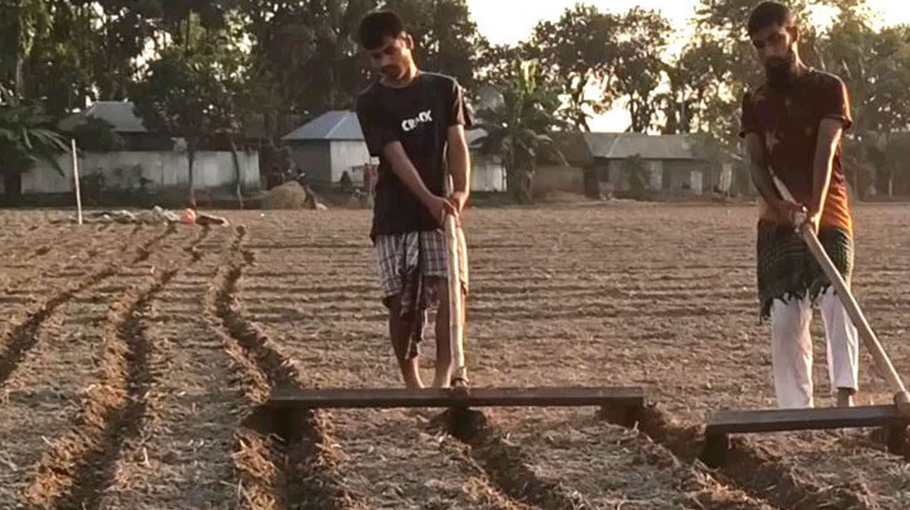Thakurgaon farmers busy cultivating early variety of potatoes

Farmers in Thakurgaon district are busy cultivating early variety of potatoes to make an extra profit. The T-Aman harvesting has not finished yet in five upazilas of the district. However, they have started cultivating potato in the empty field from where the T-Aman crops were already harvested.
Early varieties of potatoes including Diamond, Asterix, and Cardinal are being cultivated across the district this year. These varieties become suitable for sale within 55 to 60 days after planting. This season, the target was set to cultivate potato on 27,500 hectares of land in the district, with early variety of potatoes being cultivated in 2,700 hectares so far.
It was learnt that this year, farmers are buying potato seeds from private shops at Tk 80 to Tk 85, which is Tk 25 to Tk 30 taka more than last year and more than double the price from a season before that. Additionally, the price of each sack of fertilizer increased by up to Tk 200, and with extra irrigation and pesticide costs, potato production expenses reached an unusual high. Previously, the cost of potato production per bigha was around Tk 40,000. However, this cost has now risen to Tk 70,000 per bigha.
The price of government-supplied potato seeds was set between Tk 57 and Tk 66 per kg, depending on the variety. However, the supply of government seeds is insufficient compared to the demand. According to sources, the Bangladesh Agricultural Development Corporation (BADC) produces 20 to 25 percent of potato seeds, while farmers produce some potatoes to produce seeds. Various private NGOs and organizations produce the remaining portion. Due to the inadequate supply of government seeds, farmers are compelled to buy seeds at higher prices. Last year, farmers were able to purchase potato seeds for Tk 50 to Tk 60, while the price was Tk 30 to Tk 35 the season before. This year, however, they are paying Tk 80 to Tk 85 for the same seeds.
Moreover, dealers buy Triple Super Phosphate (TSP) at the government rate of Tk 1,250. However, they sell it at Tk 1,350. The government rate for Di-Ammonium Phosphate (DAP) is Tk 950, but it’s being sold at Tk 1,050, while Muriate of Potash (MOP) is priced at Tk 900 taka but sold at Tk 1,000. Urea, which is priced at Tk 1,250 taka, is sold at Tk 1,350 to the farmers.
Farmers, however, are paying Tk 1,700 for TSP, Tk 2,200 for local TSP, Tk 1,100 for DAP, Tk 1,500 for local DAP, and Tk 1,200 for MOP.
Farmers said that they have taken risk to increase potato production this year, driven by the good market prices for potatoes over the past two seasons. However, if they could obtain seeds, fertilizers, and pesticides at government rates, it would help lower their production costs. Without the right market prices, they risk losing their investment.
Tarikul, a farmer from Nargun union, said, we had to spend double the regular cost last year due to the increased prices of potato seeds, fertilizers, and pesticides. This year, the costs increased even more.
Sohel Rana, a farmer from Akcha union, said just a year ago, it costed Tk 30,000 to Tk 40,000 to cultivate potatoes on 50 decimals of land. Last year, that cost rose to Tk 50,000 Tk 55,000, and this year, it has increased to Tk 70,000 to cultivate potato in the same 50 decimals of land. I have cultivated potatoes every year, so I did it again this year. But I am very worried about the market prices.
The local agriculture office says there is a likelihood of good prices for potatoes. The agriculture department is optimistic about a good yield this season if no major natural disasters occur.
Nazma Akter, the Acting Deputy Director of the Department of Agricultural Extension in Thakurgaon, said we are regularly visiting fields to provide various advice to potato farmers. Thakurgaon's soil and climate are quite suitable for potatoes. Although production costs are higher this year, we hope that with fair market prices, farmers will be able to recover their costs.




